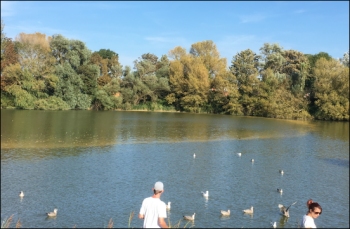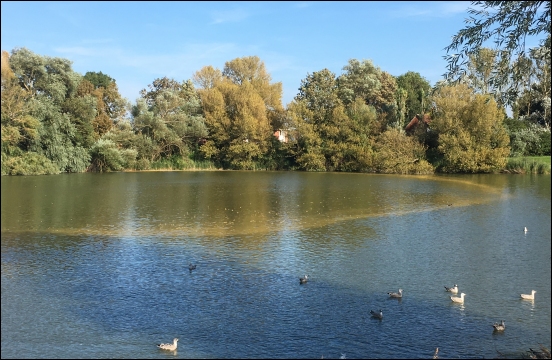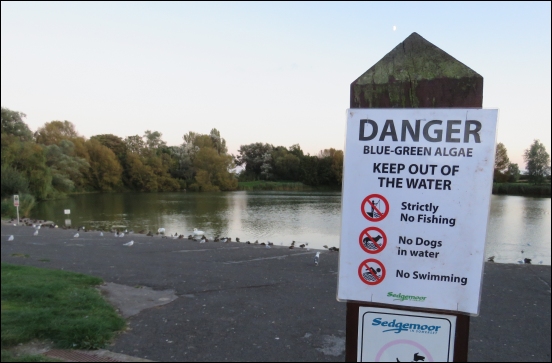New environmental tests of the water in the lakes at Apex Park in Highbridge have found potentially toxic blue-green algae remains a danger over five weeks after it was first discovered.
Claire Faun, from Sedgemoor District Council, told Burnham-On-Sea.com on Friday: “The council has this week been advised by the Environment Agency that after the weekly sampling, the Blue-Green algae levels are still above threshold in Apex Park.”
She added: “Weekly sampling will continue and the warning signs will remain in place.”
 Sedgemoor District Council is continuing to ask park users to stay away from the water.
Sedgemoor District Council is continuing to ask park users to stay away from the water.
“Our advice continues to be that dogs should not be allowed to drink, swim or paddle in the water. Also, fishing is not permitted, fish caught from the water should not be eaten, swimming is not allowed, all contact with the water should be avoided, and notices surrounding the water should be observed and abided.”
“Anyone who has come into contact with the water containing blue-green algae should wash with fresh water immediately.”
“Anyone who has come into contact with the affected water and has become ill should obtain urgent medical attention.”
Burnham-On-Sea.com first reported in August here that the algae had been discovered on the water surface of the lake next to the main car park, as pictured below.

Blue-green algae is toxic to animals and people, added council spokeswoman Claire Faun. She told Burnham-On-Sea.com: “Algae occur naturally in inland waters such as rivers, streams and lakes. When conditions are ideal for growth (i.e. a period of hot weather) an algal bloom can occur. During a bloom, the water becomes less clear and may look green, blue-green or greenish-brown. Scums can form during calm weather when several bloom forming species rise to the surface. This can look like paint, mousse or small clumps.”
“Cyanobacteria or ‘blue-green algae’, a type of blooming algae, can produce toxins. These toxins can kill wild animals, livestock and pets. They can also harm people, producing rashes after skin contact and illnesses if swallowed. Algal blooms block sunlight from reaching other plants in the water. They also use up oxygen in the water at night which can suffocate fish and other creatures. Oxygen is also used up when the bloom decays.”
“The blooms usually occur in the summer but there are no quick or easy remedies for the control of blue-green algae once they appear in a lake or pond. Not all blue-green algae blooms and scums are toxic but it is not possible to tell from appearance and so it’s best to assume they are harmful and take several precautions.”
Pictured: The algae outbreak at Apex Park in Highbridge







